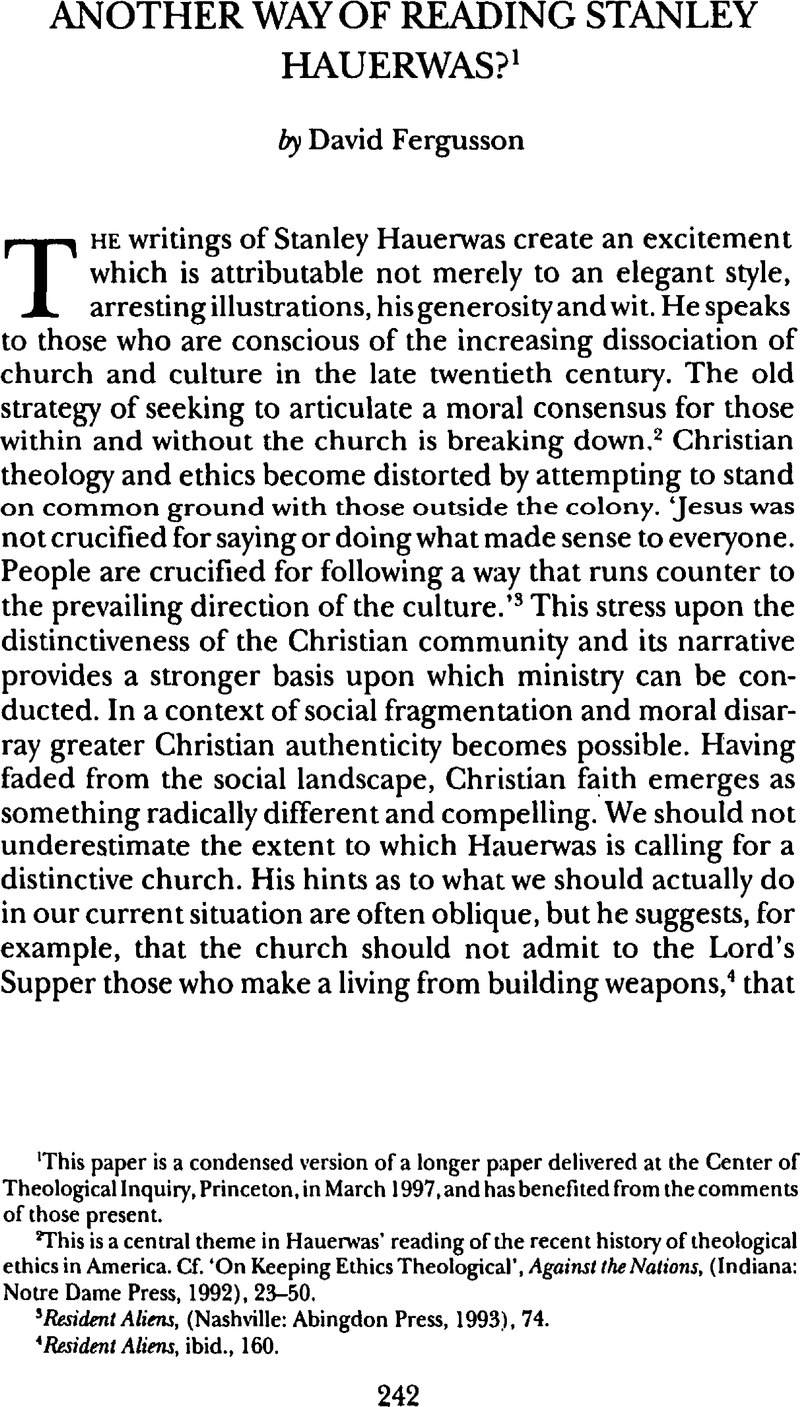Published online by Cambridge University Press: 30 January 2009

2 This is a central theme in Hauerwas' reading of the recent history of theological ethics in America. Cf. ‘On Keeping Ethics Theological’, Against the Nations, (Indiana: Notre Dame Press, 1992), 23–50.Google Scholar
3 Resident Aliens, (Nashville: Abingdon Press, 1993), 74.Google Scholar
4 Resident Aliens, Ibid., 160.
5 After Christendom (Nashville, Abingdon, 1991), 100.Google Scholar
6 Ibid., 151.
7 In Good Company (Indiana: Notre Dame, 1995), 196–197Google Scholar.
8 This is argued persuasively by Rasmusson, Arne, The Church as Polis: From Political Theology to Theological Politics as Exemplified by Jürgen Moltmann and Stanley Hauerwas (Indiana: Notre Dame Press, 1996)Google Scholar.
9 E.g. A Community of Character (Indiana: Notre Dame Press, 1981) 6.Google Scholar
10 In Good Company, op. cit., 57.
11 The Character of our Communities (Nashville: Abingdon, 1995), Chapter 4Google Scholar.
12 E.g. the criticism of Gerhard Ebeling's treatmentof the solascriptura principle in Unleashing the Scripture (Nashville: Abingdon Press, 1993) 27Google Scholar.
13 Even though I do not share the liberal rejection of the classical christological formulas, the liberal concern to recover the centrality of Jesus' life strikes me as right.’ A Community of Character, op. cit., 40.
14 E.g. The Peaceable Kingdom, (Indiana: Notre Dame Press, 1983), 72ff.Google Scholar
15 I am thinking here especially of The Peaceable Kingdom, op. cit., chapter 5 and A Community of Character, op. cit., chapter 2.
16 Unleashing the Scripture, op. cit., 60ff.
17 It is perhaps significant that the Lutheran Formula of Concord, Article XII, makes a similar criticism of the Anabaptists. I am indebted to George Hunsinger for this reference.
18 Church Dogmatics IV/3 (Edinburgh: T&T Clark, 1961) 38ffGoogle Scholar.
19 A Community of Character, op. cit., 228.
20 Ibid., 106.
21 Ethics After Babel (Clarke, Cambridge, 1988), 214.Google Scholar
22 E.g. Thick and Thin: Moral Argument at Home and Abroad (Indiana: Notre Dame Press, 1994)Google Scholar.
23 Cf. The strangely undeveloped comment: ‘What allows us to look expectantly for agreement among those who do not worship God is not that we have a common morality based on autonomous knowledge of autonomous nature, but that God's kingdom is wider than the church.’ Christian Existence Today, (Durham: Labyrinth Press, 1988), 17Google Scholar. Similar observations elsewhere are generally not integrated into his overall argument. ‘Unity comes not from the assumption that all people share the same nature, but that we share the same Lord. Though certainly the fact that we have a common creator provides a basis for some common experience and appeals.’ A Community of Character, op. cit., 106.
24 Karl Barth, Church Dogmatics IV-3, op. cit., 115–6.